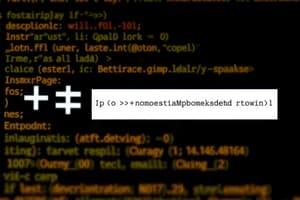Podcast
Questions and Answers
What is a virtual function in C++?
What is a virtual function in C++?
A virtual function is a member function declared in a base class and redefined in a derived class.
How is a virtual function created in C++?
How is a virtual function created in C++?
To create a virtual function, precede the function's declaration in the base class with the keyword 'virtual'.
What does the redefinition of a virtual function in a derived class represent?
What does the redefinition of a virtual function in a derived class represent?
The redefinition of a virtual function in a derived class implements its operation specific to that derived class.
How do virtual functions behave when accessed via a pointer in C++?
How do virtual functions behave when accessed via a pointer in C++?
What is the significance of virtual functions in C++?
What is the significance of virtual functions in C++?
What keyword precedes a function declaration to make it virtual in C++?
What keyword precedes a function declaration to make it virtual in C++?
How is the version of a virtual function determined at runtime in C++?
How is the version of a virtual function determined at runtime in C++?
What is the key concept behind achieving run-time polymorphism in C++?
What is the key concept behind achieving run-time polymorphism in C++?
Is it necessary to use the 'virtual' keyword when redefining a virtual function in a derived class in C++?
Is it necessary to use the 'virtual' keyword when redefining a virtual function in a derived class in C++?
How is the redefinition of a virtual function in a derived class different from function overloading in C++?
How is the redefinition of a virtual function in a derived class different from function overloading in C++?
Flashcards are hidden until you start studying
Study Notes
Virtual Functions
- A virtual function is a member function declared in a base class and redefined by a derived class.
- To create a virtual function, precede the function's declaration in the base class with the keyword virtual.
Declaration and Redefinition
- The keyword virtual is not needed when redefining a virtual function in a derived class, but it is not an error to include it.
- When a base class has a virtual function, derived classes can redefine it relative to their own class.
Run-Time Polymorphism
- Run-time polymorphism is achieved when a base-class pointer (or reference) is used to access a virtual function.
- The type of object pointed to by the pointer determines which version of the virtual function is executed.
- This determination is made at run time.
Differences from Function Overloading
- Virtual function redefinition is not the same as function overloading.
- The prototype for a redefined virtual function must match the original declaration.
Accessing Virtual Functions
- Virtual functions can be called normally using an object's name and the dot operator.
- However, run-time polymorphism is only achieved when accessing through a base-class pointer (or reference).
- Calling a virtual function through a base-class pointer allows for dynamic binding, which is the basis for run-time polymorphism.
Studying That Suits You
Use AI to generate personalized quizzes and flashcards to suit your learning preferences.




